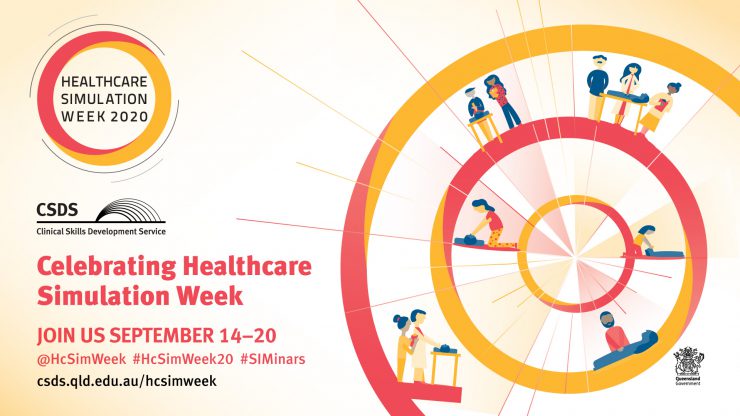Luke Wainwright
Luke has 25 years of experience in critical care nursing with the last 10 years directly involved in simulation-based education. Working in many roles at CSDS including, the Learning and Development Manager, Simulation Manager, Operations Manager, Simulation Educator and Nurse Educator.
With a keen interest in disruptive technology, he has been involved and led many projects for digital transformation, facility and workflow redesign, online and face to face simulation-based education programs. Luke is also a member of the Standards Australia IT-031/IT-031-01 Computer Modelling and Simulation Committee and was a longstanding member of the Australian Society for Simulation in Healthcare Executive Committee.
SIMinar 1: Responding to COVID-19
SIMinar 3: Faculty Webinar Series – The case for a problem first approach
Dr Hansel Addae MBBS, FACEM
Hansel is a staff specialist at the Queen Elizabeth II Jubilee Hospital Emergency department in Brisbane.
He is Co Lead Faculty of the Pocket Simulation Centre at the QEII Hospital and a Term Supervisor for the ACEM special Skills post in Simulation which he helped found in 2015.
Holding a Graduate Certificate in Simulation and has Completed the Comprehensive Instructor Training Course at IMS in Boston. He has a special interest in Simulation in virtual environments and has Co-Founded a Virtual Reality Training Hospital called Valley General Hospital. His other interests include Clinical Ultrasound and Echocardiography. He has co-published a book on ‘Communication with RESPECT for Health Care Professionals’. He has also presented in Educational Conferences.
Grad Cert Health Care Simulation, Grad Diploma, Clinical Ultrasound, Emergency Physician. QE II Jubilee Hospital, Brisbane. Term Supervisor ACEM Special Skills in Medical Simulation Senior Lecturer, UQ Clinical School, Metro South
Kim Gourlay
Having been a registered Nurse since December 2014, Kim has worked across several specialties including Neurosurgery, Lower GI Surgery and General Medicine, spending several years in Nursing Pool. Kim has not only worked in many specialties, he has worked in hospitals as far as New Zealand, Scotland and England gaining exceptional experiences through his travels.
Moving from a Clinical Facilitator for Undergraduate Nursing Students role, to an Acting Simulation Coordinator at The Prince Charles Hospital in July 2017 to January 2018. After a brief stint at Logan Hospital as the Acting Nurse Educator (Simulation), Kim then returned to The Prince Charles Hospital permanently.
Kim is the Pocket Centre Lead at The Prince Charles Hospital and works alongside the Nurse and Medical Educators, assisting with the delivery of the ‘UQ Critical Care Course’, and multiple programs conducted by the Emergency Department for their Registrars and Residents. Recently working closely with Safety and Quality around the development of COVID patient transfers around the hospital.
Not one to do things by halves, he has spent 25 years with his wife Susan. With having a combined family of 6 children (3 each) and 15 grandchildren, soon to be 16 with another on the way. A dog named Benson, and a fighting fish named Oscar. He is one busy, busy guy!
Prudence Upson
Prudence studied a Bachelor of Marketing and Public Relations before starting a career in magazine print media, working to implement national advertising campaigns. With a change of career in mind Prue returned to university to pursue a career as a Registered Nurse, working primarily in theatres and procedure rooms.
Currently A/Simulation Educator who has been with CSDS for 3.5 years, with a passion for using simulation to question the status quo and improve the way we work.
Before the wave of COVID-19 forced many changes, Dr Fahy and the team would perform weekly simulation exercises as part of the Emergency Medicine registrar education programme. Unfortunately, due to the pandemic there has been alterations to the previous schedule and many of these simulations have been halted for the time being.
Dr Fahy and the team have also put on more ad hoc multi-disciplinary insitu simulation exercises within the ED, usually to address specific processes needs or as a means of team building through activity and communication.
When Dr Fahy is not working to save lives in the ED, he keeps himself very busy looking after two small boys and a dog.
Stephen Poyser
Stephen is the Innovation Lead for the CSDS, and has fostered a culture of technological curiosity in innovation both internally to CSDS and more widely across Queensland Health. He has extensive experience in leading multidisciplinary teams, design thinking, ideation facilitation and digital interaction and games.
Stephen has a passion for problem solving and a drive to inspire positive change through modelling a mindset of continuous improvement.
SIMinar 3: Faculty Webinar Series – The case for a problem first approach
Dr Mia McLanders
Mia is an applied researcher with a background in cognitive psychology. Her research experience spans a range of clinical areas, including critical care, airway management, and patient monitoring. Mia uses human factors and user-centred design methods to develop interventions that improve process flow and patient outcomes.
In 2017, Mia received a Young Talent award by the Resilience Engineering Association and the Ian Jacobs Fellowship Award by the Australian Resuscitation Council. Both awards related to her work improving teamwork during neonatal resuscitation.
Dr Chiara Santomauro
Chiara is a Research Fellow in human factors psychology with much of her research spanning the healthcare domain. Chiara’s research experience covers a range of topics and clinical areas, including interruptions in critical care, patient monitoring in anaesthesia, and telehealth for rural and remote trauma care.
Chiara specialises in using simulation- and laboratory-based studies in her research, and she is also experienced in using simulation for usability testing. Chiara was recently awarded an Advance Queensland Industry Research Fellowship to explore the effectiveness of interactive telepresence technology to improve rural and remote trauma care.
Kirsty Beattie
Kirsty’s background is in Organisational Psychology and the science of learning. Her research involves the application of human factors principles, educational science, and psychological theories in simulation-based practice to optimise the acquisition and development of complex surgical skills.
Over the past few years, Kirsty has also carried out applied research in the aviation sector to mitigate safety risks for air-traffic controllers, as well as user-interface design and usability testing to enhance website accessibility for seniors.
Kate and her team manage the administration of course delivery, faculty engagement and venue hire.
SIMinar 5: Conversations on the couch with Kate… The birth of MEP
She completed her RN and midwifery training in the UK and worked her way up through multiple settings. Advancing herself to senior midwife for several years before immigrating to Australia in 2000. She started working in a private facility in Brisbane and moved to Royal Brisbane Women’s Hospital (RBWH) in October 2000.
She undertook several different roles at RBWH. She started as a midwife in the clinical area and later moved to case load midwifery and then to team midwifery. She then progressed onto midwifery educator and clinical midwifery consultant for birthing services. She is now concurrently working at CSDS and Digital Metro North (DMN). In DMN, she provides training and support for the implementation of FetaLink, a centralised fetal monitoring system at RBWH.
SIMinar 5: Conversations on the couch with Kate… The birth of MEP
Before immigrating to Australia, he was a senior web developer and spent five years as a Computer Science lecturer for various universities in the Philippines. He is currently completing his Graduate Certificate in Clinical Redesign and Master’s in Information Technology.
SIMinar 5: Conversations on the couch with Kate… The birth of MEP










